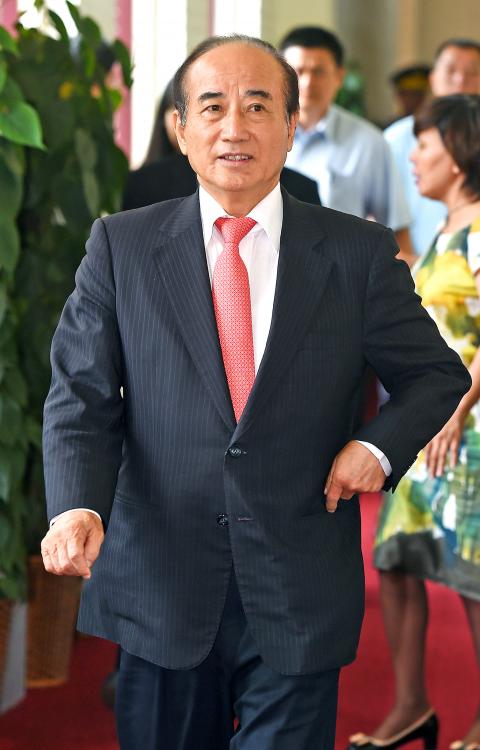Legislative Speaker Wang Jin-pyng (王金平) yesterday again turned down Chinese Nationalist Party (KMT) prospective presidential candidate and Deputy Legislative Speaker Hung Hsiu-chu’s (洪秀柱) invitation to direct her campaign after Hung suggested in an interview the day before that Wang’s participation would help put an end to gossip.
“I have been very clear on the reasons why I cannot accept the position of campaign director. I hope [Hung] would not put me in a difficult position. Putting me in a difficult position is tantamount to putting the legislature in a difficult position,” Wang said.
Wang had declined an offer last month, saying his neutrality and tight schedule precluded him from taking the job. He emphasized that, with the next legislative plenary session starting in September, he would have to deal with issues concerning draft legislation and question-and-answer sessions at the legislature.

Photo: Liao Chen-huei, Taipei Times
“What would happen to the legislature if [the deputy legislative speaker] runs for president and [the legislative speaker] exerts all his efforts on campaign work?” Wang said.
Asked about rumored efforts by some KMT members to obstruct Hung’s nomination with a signature drive, Wang said it is action being taken by individual party members and he would “try [his] best to dissuade them.”
Wang confirmed that he would attend the KMT’s national party congress scheduled for Sunday, when Hung is expected to be officially nominated as the party’s presidential candidate.
Hung later yesterday said that she would continue to ask for Wang’s help.
While she understands and respects Wang’s decision, it has already been demonstrated in Pingtung and Kaohsiung, where she visited in the past few days, that Wang’s help would be required, she said.
In an interview on Tuesday, Hung said Wang told her that “since he would definitely support the party’s legislative campaign, the presidential one is certain to be taken care of as well.”
“It is not possible for Wang to be absent from campaign activities for the party’s legislative candidates, but I would still hope that he could take a title [in the campaign team] to show that we are a team,” Hung said.
Hung said that she had talked to Wang about the importance of him having a role in her team, otherwise “people on the outside” would get the wrong idea about their relationship.
“I will ask KMT Chairman Eric Chu (朱立倫) [to persuade Wang] with me,” she said.
Separately yesterday, Hung told representatives of women’s groups in Kaohsiung that Taiwan must not fear a rising China, but should learn to make use of it, like a boat being lifted by a rising tide.
Amid China’s rise, she said, there has been opposition to stronger ties with China every step of the way, from opposing direct transportation links and free-trade agreements for both goods and services to fighting Taiwan’s bid to join the Asian Infrastructure Investment Bank.
The rise of China is a reality that Taiwan should not be afraid of, Hung said, adding that it should instead adopt a strategy that makes use of China’s rise.
Additional reporting by CNA

SECURITY: As China is ‘reshaping’ Hong Kong’s population, Taiwan must raise the eligibility threshold for applications from Hong Kongers, Chiu Chui-cheng said When Hong Kong and Macau citizens apply for residency in Taiwan, it would be under a new category that includes a “national security observation period,” Mainland Affairs Council (MAC) Minister Chiu Chui-cheng (邱垂正) said yesterday. President William Lai (賴清德) on March 13 announced 17 strategies to counter China’s aggression toward Taiwan, including incorporating national security considerations into the review process for residency applications from Hong Kong and Macau citizens. The situation in Hong Kong is constantly changing, Chiu said to media yesterday on the sidelines of the Taipei Technology Run hosted by the Taipei Neihu Technology Park Development Association. With

A US Marine Corps regiment equipped with Naval Strike Missiles (NSM) is set to participate in the upcoming Balikatan 25 exercise in the Luzon Strait, marking the system’s first-ever deployment in the Philippines. US and Philippine officials have separately confirmed that the Navy Marine Expeditionary Ship Interdiction System (NMESIS) — the mobile launch platform for the Naval Strike Missile — would take part in the joint exercise. The missiles are being deployed to “a strategic first island chain chokepoint” in the waters between Taiwan proper and the Philippines, US-based Naval News reported. “The Luzon Strait and Bashi Channel represent a critical access

‘FORM OF PROTEST’: The German Institute Taipei said it was ‘shocked’ to see Nazi symbolism used in connection with political aims as it condemned the incident Sung Chien-liang (宋建樑), who led efforts to recall Democratic Progressive Party (DPP) Legislator Lee Kun-cheng (李坤城), was released on bail of NT$80,000 yesterday amid an outcry over a Nazi armband he wore to questioning the night before. Sung arrived at the New Taipei City District Prosecutors’ Office for questioning in a recall petition forgery case on Tuesday night wearing a red armband bearing a swastika, carrying a copy of Adolf Hitler’s Mein Kampf and giving a Nazi salute. Sung left the building at 1:15am without the armband and apparently covering the book with a coat. This is a serious international scandal and Chinese

COUNTERINTELLIGENCE TRAINING: The ministry said 87.5 percent of the apprehended Chinese agents were reported by service members they tried to lure into becoming spies Taiwanese organized crime, illegal money lenders, temples and civic groups are complicit in Beijing’s infiltration of the armed forces, the Ministry of National Defense (MND) said in a report yesterday. Retired service members who had been turned to Beijing’s cause mainly relied on those channels to infiltrate the Taiwanese military, according to the report to be submitted to lawmakers ahead of tomorrow’s hearing on Chinese espionage in the military. Chinese intelligence typically used blackmail, Internet-based communications, bribery or debts to loan sharks to leverage active service personnel to do its bidding, it said. China’s main goals are to collect intelligence, and develop a